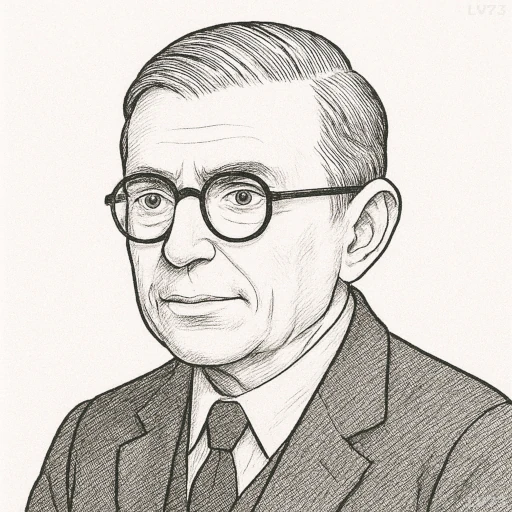“That God does not exist, I cannot deny, That my whole being cries out for God I cannot forget.”

- June 21, 1905 – April 15, 1980
- Born in France
- Philosopher, novelist, playwright
table of contents
Quote
“That God does not exist, I cannot deny, That my whole being cries out for God I cannot forget.”
Explanation
In this quote, Sartre articulates the existential dilemma between the intellectual recognition of atheism and the deeply ingrained human desire for something greater, such as God or a higher meaning. Sartre begins by acknowledging the rational truth that, from his existentialist perspective, God does not exist—there is no divine being to provide ultimate meaning or purpose. This aligns with Sartre’s belief that existence is not determined by a higher power, and meaning must be created by the individual. However, the second half of the quote reveals the emotional and existential struggle: despite this intellectual conclusion, Sartre’s “whole being cries out for God.” This phrase reflects the human condition, where we may recognize the absence of divine order or purpose, yet still feel an innate longing or need for something greater, something that offers certainty and guidance in a chaotic, uncertain world.
Sartre’s existentialism is often described as freedom in the face of absurdity, and this quote captures the tension between freedom and the human need for meaning. He acknowledges that even in the absence of belief in God, the human desire for transcendence is deeply rooted in our nature. This tension between intellectual clarity and emotional need reflects the existential paradox: on one hand, humans are free to create their own meaning and must accept the responsibility that comes with it; on the other hand, they still experience the emotional pull of a desire for external guidance or a sense of divine purpose. Sartre’s words reflect this inherent conflict—where reason and emotion are in opposition, and the absence of God does not eliminate the deep yearning for his presence.
In modern contexts, this quote resonates with the human struggle with faith in a secular world. Many people today find themselves caught between the rational rejection of traditional beliefs and the emotional longing for a sense of purpose or connection to something greater. Sartre’s reflection on this tension invites us to think about the role of religion and spirituality in our lives today. Despite living in a time where science and rationalism have provided explanations for many aspects of existence, the desire for transcendent meaning remains a powerful force. This quote challenges us to face the existential reality that meaning is not given to us, but rather, it must be created by each individual, even as we are drawn to the comfort and certainty that the idea of God or a higher power can offer.
Would you like to share your impressions or related stories about this quote in the comments section?

